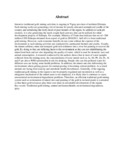| dc.description.abstract | Intensive traditional gold mining activities is ongoing in Tigray province of northern Ethiopia. Such
mining works are generating a lot of income for poorly educated unemployed youths of the country
and subsidizing the lively hood of poor farmers of the region. In addition to such job creation, it is
also generating the much sought hard currency that can be utilized for other development projects
of Ethiopia. For example, Ministry of Trade data indicate that out of ~500 million USD Ethiopia
29
obtained from export of gold in 2010/2011, half of it is from traditional gold mining. However, such
economic benefits do not come without the expense of the environment as such mining activities are
conducted by uneducated farmers and youths. Usually, the miners arbitrary mine and transport gold
rich sediments into a river for panning to recover the gold. By doing so they are inflicting harm to the
environment as they are not rehabilitating the mined land back and are also degrading the quality of
water, which is used for domestic uses and animal consumption. A research conducted by the authors
shows that in most of water samples collected from the mining areas, the concentrations of toxic
metals such as As, Sb, Pb, Zn, Fe, Al and F are above WHO permissible levels for drinking. People
who use this polluted water for different uses are facing some health problems. In addition, the miners
are also deforesting the environment where getting grasses for animal grazing is becoming critical
problem. As a result animals are facing food scarcity and metabolic health disturbances. Generally, if
the ongoing traditional gold mining in the region is not be properly regulated and monitored as well
as a mitigation mechanism of the mined areas is not emplaced, it is likely that it continues to cause
unwarranted environmental degradation problems. Therefore, an efficient traditional gold mining
system such as reclamation of mined sites and panning of the gold in isolated ponds is warranted so
that these gold resources play their own share in sustainable development of the region.
Key words: Traditional gold mining, animal and human health, environmental degradation, Tigray | en_US |

